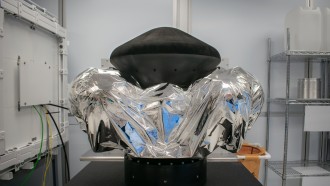Breast milk sold online may contain more than the advertised substance, according to a new study.
Samples of the material purchased from virtual stores were examined, revealing 10 percent of the items purchased contained some cow milk. This may have been added by sellers to stretch milk from human mothers, in order to increase profit margins, researchers state.
Some infants may be allergic to cow milk, while others could have trouble digesting the substance, posing hazards to babies from the diluted products, according to investigators on the study. Cow's milk is generally not considered to be a risk to human infants, although some pediatricians recommend avoiding consumption of the material by babies under 12 months of age.
Human breast milk sells online for between 50 cents and $3 per ounce. Many parents choose to buy human breast milk in cases of adoption, when the mother is unable to produce an adequate supply, or when fathers are left raising an infant alone. Most Web sites on which mothers sell their milk provide instructions on how donors should safely collect the natural food and store it. However, screenings of mothers and their milk are rarely carried out, leaving buyers with little choice except to trust the sellers if they are to purchase the product. Commercial human breast milk banks, which cater to sick infants, carefully screen women who make donations, and pasteurize the product in order to kill bacteria in the liquid.
Researchers were unable to tell if the human breast milk in the samples was diluted with pure cow's milk or infant formula based on bovine milk. The researchers estimated that 10 of the 11 adulterated breast-milk samples they tested contained at least 10 percent cow's milk.
Human breast milk sold online has previously been found to contain high concentrations of potentially hazardous bacteria. Poor collection and storage methods could be responsible for the presence of these microorganisms, researchers believe.
"Purchasing breast milk online is not a good idea and introduces too many risks for infants," said Sarah Keim from the Center for Biobehavioral Health at Nationwide Children's Hospital in Cincinnati, Ohio.
Providing infants with breast milk has gone through phases of popularity since the introduction of commercial formulas. Feeding babies milk from human mothers is more popular now than it was a few decades ago, although concern about germs has led some parents to avoid purchasing the fluid online. Breast pumps are now covered by many insurance plans, allowing more mothers to feed infants human milk with greater convenience. Some parents choose to breast feed for a short period, before the mother returns to work, reducing time spend breast feeding.
Chemical analysis of human milk sold online was detailed in the journal Pediatrics.
Photo: Dave Rezendes | Flickr








